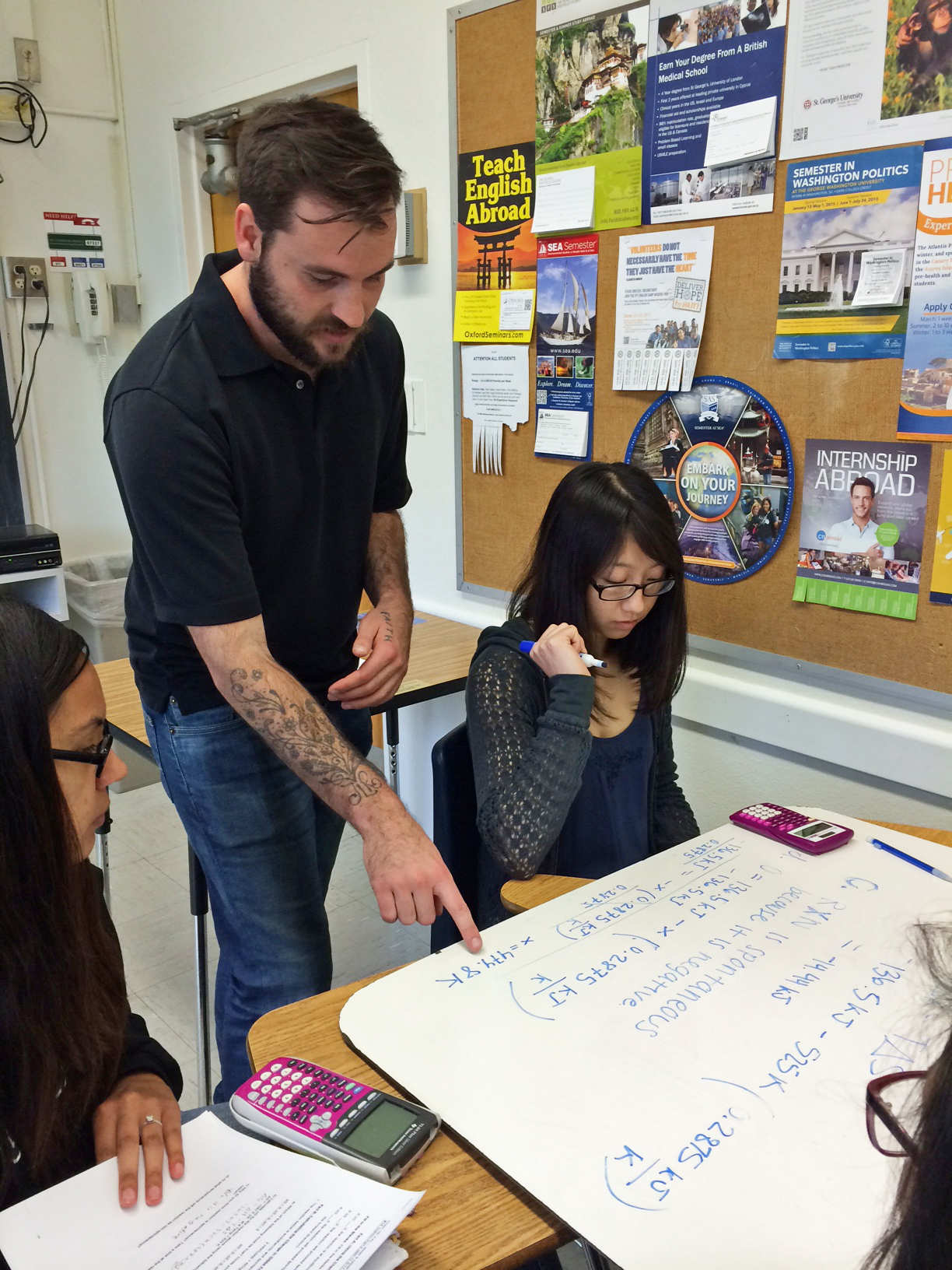 Jordan Roselli facilitates a PAL group that includes Daniela Tapia-Acosta, left, and Chee Lor.
Jordan Roselli facilitates a PAL group that includes Daniela Tapia-Acosta, left, and Chee Lor.Student support programs offered by Sacramento State’s College of Natural Sciences and Mathematics are showing great success, and college officials expect even more advances as new programs are added to the mix. Student success programs are designed to give additional support in all areas of students' university life. And NSM has found that when it comes to helping a student, often the best person to do that is another student.
New this semester is the Center for Science and Math Success (www.csus.edu/nsm/successcenter). It serves as an umbrella organization, bringing together five existing programs: Peer Assisted Learning (PAL), the Science Educational Equity (SEE) Program, Peer Assisted Student Success (PASS) Advising, the Learning Assistant Program, and the Commit to Study Program.
“These programs serve a lot of students,” says the center's interim director, Enid Gonzalez-Orta. “We’ve been working together a lot, so when looking at resources and how we manage them, it just made sense to make this more of a formal partnership.”
The center also has two affiliate members: the Natural Sciences Advising Center and the Sustainable Interdisciplinary Research to Inspire Undergraduate Success (SIRIUS) Project.
Also new is the Peer Leadership Academy, a program that will provide further support and training for the college’s more than 100 student leaders.
NSM already has generated great success with existing programs such as PAL. While that program utilizes a students-helping-students approach, it is much more than a tutoring system. The 48 facilitators – including participants from the College of Engineering and Computer Science, and the College of Health and Human Services – work with students in small groups, using a process that trains the students to synthesize solutions from what they already have learned.
“Instead of simply following someone else’s explanation of how to solve a problem, students work with the facilitators in small groups to construct their own understanding,” says Jennifer Lundmark, a biology professor and PAL’s director.
Each facilitator works with 15 students divided into groups of three or four around multiple whiteboards. Each student takes a turn as the primary problem-solver, with the facilitator supporting his or her progress. If a student is confused about the subject matter in a lecture of 150 people, it can be frustrating and isolating. “Having a small group of students working in collaboration changes that dynamic,” Lundmark says.
PAL was launched four years ago and already is seeing results. “Across all courses that have PALs, students opting into the program pass courses at an average rate 15 percent higher than non-PAL students,” Lundmark says. “In some courses, it’s almost 30 percent.”
The program also benefits the facilitators, who develop their own skills in areas such as leadership, group management, and planning. And every spring, they gain valuable experience conducting research projects aimed at improving PAL. One of those research projects is headed for publication with student authors.
The new Peer Leadership Academy will add a new level to the experience. “The academy will help the leaders deepen their skills even more,” NSM Dean Jill Trainer says.
While still under development, the academy will provide student leaders with training in areas such as conflict resolution and other leadership expertise, as well as more personal skills such as suicide prevention, through forums such as guest speakers and classes.
Meanwhile, the Center for Science and Math Success serves as the glue holding the groups together, with an executive committee reviewing the best approaches to generate funding and learning opportunities.
“We want to make sure the individual entities maintain their identity,” says Gonzalez-Orta. “We all work very closely together, and that’s been very fruitful.”
For more information on the student success programs, visit the website or call (916) 278-6519. For media assistance, call Sacramento State’s Public Affairs office at (916) 278-6156. – Craig Koscho
